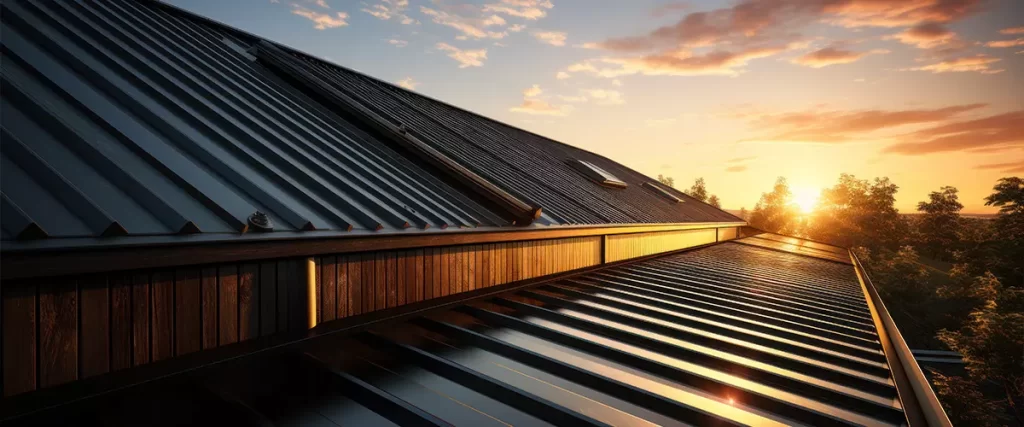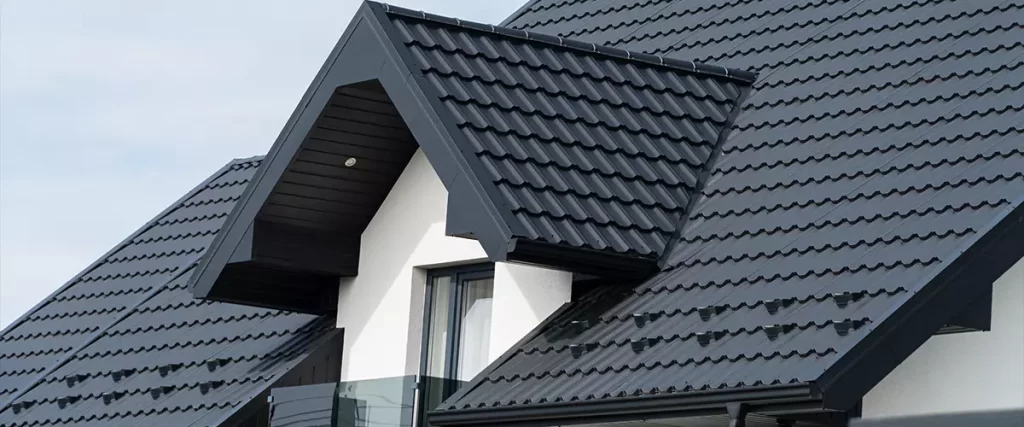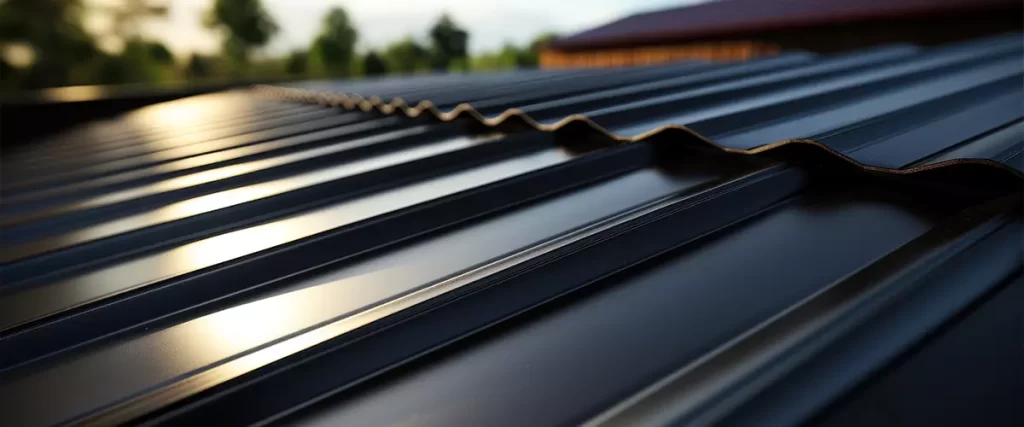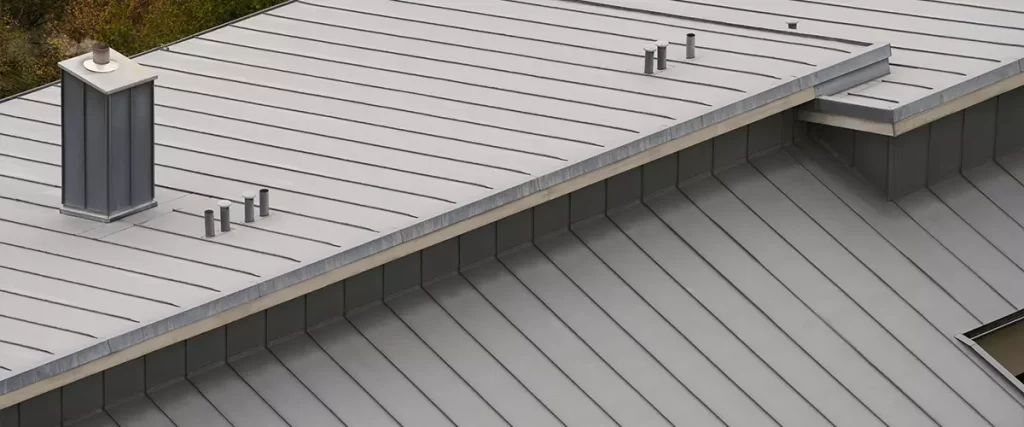Choosing between metal roofing and traditional shingles can be hard. Metal roofs tend to last longer than asphalt shingle roofs. This article will show the pros and cons of each, helping you decide.
Keep reading to learn more!
Key Takeaways
- Metal roofs cost more upfront but save money long-term because they last 40 to 70 years and reduce cooling costs by up to 25%.
- Metal roofing is tougher, lasting over 50 years with less need for repairs compared to traditional shingles that might last only 20 years.
- Traditional shingles are cheaper at first and easier to install but don’t last as long or offer the same energy savings as metal roofs.
- Metal roofs can better handle extreme weather and are more eco-friendly since they’re often made from recycled materials and can be recycled again.
- Installing solar panels is easier on metal roofs, making them a good choice for homeowners looking into renewable energy.

Cost Comparison
Metal roofing and traditional shingles differ in their initial installation costs and long-term cost efficiency, influencing homeowners’ budget decisions and financial planning. Understanding these aspects can help homeowners make informed choices about the most cost-effective option for their specific needs.
Initial installation costs
Putting a new roof on your house is a big deal. The cost to get started varies depending on if you choose metal roofing or traditional shingles. Metal roofs usually have higher upfront costs.
This is because the materials and labor for installing metal panels or shingles can be more expensive than those needed for an asphalt roof. For example, while the price for installing asphalt shingles might range from $3 to $5 per square foot, metal roofing can cost between $7 to $10 per square foot.
This difference in initial installation costs means choosing a metal roof requires more money at the start. But, it’s also worth noting that this higher investment may pay off in the long run with lower energy costs and less need for repairs or replacements.
On the other hand, traditional asphalt shingles are popular for their affordability and ease of installation by most roofing contractors, making them a go-to choice for many homeowners looking to update their roofs without breaking the bank.
Long-term cost efficiency
Metal roofs may cost more upfront than traditional shingles, but over time they offer significant savings. A metal roof can last 40 to 70 years, while asphalt shingles need replacing every 12 to 20 years.
This means homeowners save on frequent replacement costs with metal roofing. Metal roofs also reduce cooling costs by up to 25% because they reflect heat away from the house. Over decades, these savings add up, making metal roofing a smart choice for long-term cost efficiency.
Choosing a durable roof like metal significantly cuts down on maintenance and repair bills. Unlike asphalt shingles that may lose granules or get damaged by high winds, metal roofing stands strong against extreme weather conditions.
This durability means less money spent on fixing or replacing parts of the roof deck underneath. Homeowners looking for an energy efficient and low maintenance option find that investing in a metal roof pays off over the years, offering both financial benefits and peace of mind.

Durability and Lifespan
Metal roofing offers superior durability, with high resistance to extreme weather conditions such as heavy rain and wind. It also has a longer lifespan compared to traditional shingles, requiring less frequent repairs and replacements over time.
Resistance to extreme weather conditions
Metal roofs stand strong against extreme weather. They are fire resistant and can handle high winds, heavy rain, and flying debris better than traditional materials like asphalt shingles or wood shakes.
This makes metal roofing a safe choice for areas prone to wildfires or storms.
Metal roofing provides excellent wind resistance, often withstanding gusts up to 140 miles per hour.
Traditional shingles may suffer more damage in bad weather. They might need more frequent replacement after storms. In contrast, metal roofing panels show greater resilience, needing less repair over time.
This durability under tough conditions is a key benefit for homeowners looking at long-term roofing solutions.
Frequency of repairs and replacements
Metal roofs outlast traditional shingle roofs significantly, often lasting 50 years or more, compared to the average 20-year lifespan of traditional asphalt shingle roofs. Furthermore, metal roofs necessitate far less maintenance and repairs over time.
The resilience of metal roofing makes it a cost-effective option for homeowners in the long run, reducing the frequency of repairs and replacements typically associated with traditional shingle roofs.
Additionally, metal roofing provides superior resistance to extreme weather conditions such as wind, hail, and heavy rainfall compared to traditional shingles. This means that homeowners with metal roofs are less likely to incur repair costs due to weather-related damage over the roof’s lifespan.
In terms of repair and replacement frequency, these factors render metal roofing an attractive choice for homeowners seeking a durable and low-maintenance solution for their homes.

Energy Efficiency
Metal roofing offers superior energy efficiency through its heat reflection and insulation properties. This can result in noticeable impact on cooling and heating costs for homeowners.
Heat reflection and insulation properties
Metal roofing has excellent heat reflection and insulation properties, which can help reduce the amount of heat transferred into your home. This can lower cooling costs during hot summers by keeping the interior cooler.
According to studies, metal roofs reflect more solar radiation than traditional asphalt shingles, reducing heat absorption into the attic and living spaces. Furthermore, certain metal roofs with specific coatings can improve energy efficiency in colder climates by preventing heat loss during winter months.
Homeowners should consider these factors when deciding between metal roofing and traditional shingles to make an informed choice about their energy costs over time, especially in regions with extreme weather conditions or fluctuating temperatures.
Moreover, these features align with sustainable living goals as they lower reliance on artificial heating and cooling systems.
Impact on cooling and heating costs
Metal roofing can significantly reduce cooling costs. Metal roofs reflect sunlight, keeping the house cooler and decreasing the need for air conditioning. They also have insulating properties that help regulate indoor temperatures, reducing heating costs in winter.
On the other hand, traditional shingles absorb more heat, making homes hotter and increasing reliance on air conditioning during warmer months. This results in higher energy consumption and elevated cooling costs for homeowners over time.
Therefore, opting for metal roofing can lead to substantial savings on cooling and heating expenses throughout the year.
Suitability for Solar Panels
Metal roofing is an excellent choice for solar panels because it is compatible with various solar installation systems. The smooth design of metal roofs enables the seamless integration of solar panels without compromising the aesthetic appeal or structural integrity.
Furthermore, conventional shingles might pose difficulties in accommodating and supporting the weight and installation requirements of solar panels, making metal roofing a more practical option for homeowners considering sustainable energy solutions.
Metal roofing compatibility
Metal roofing complements solar panels, providing an excellent option for homeowners seeking to utilize sustainable energy. The even surface of metal roofs facilitates simple and secure solar panel installation, optimizing their performance.
When weighing metal versus asphalt roof choices, the harmony between metal roofing and solar panels can significantly impact long-term savings and environmental benefits.
Given the increasing homeowner interest in renewable energy, grasping the synergy of metal roofing with solar panels becomes pivotal. This fusion not only advances sustainability but also presents an avenue for reducing energy expenses over time.
Examining this aspect in conjunction with durability and environmental effects can aid homeowners in making well-informed choices regarding their roofing project.
Transitioning from the discourse about metal roofing compatibility with solar panels—let’s explore “Considerations for Shingles and Solar Installation”.
Shingles and solar installation considerations
Metal roofing is compatible with solar panel installation, as the panels can be easily mounted directly onto the metal surface. However, traditional shingles present more considerations to keep in mind.
If you’re planning to install solar panels on an existing shingle roof, you need to consider its age and condition. It’s important to assess whether the old roof can handle the added weight of solar panels without compromising its integrity or requiring extra reinforcement.
Also, integrating the panels into the existing layer of shingles during the solar panel installation raises the installation costs due to additional labor and material expenses. Homeowners should carefully weigh these factors before deciding between metal roofing and traditional shingles for their solar panel installations.
Best Solar Panel Manufacturers
When selecting solar panels, choosing reputable manufacturers ensures high quality, efficiency, and durability for long-term energy solutions.
- SunPower: Known for their high-efficiency panels and innovative technology, ideal for maximizing energy production.
- LG Solar: Offers reliable, durable panels with excellent warranties, making them a trusted choice for homeowners.
- Canadian Solar: Provides affordable and versatile panel options suitable for a variety of installations and climates.
- First Solar: Specializes in advanced thin-film panels, excelling in energy performance under challenging conditions.
- Trina Solar: A popular choice worldwide, delivering dependable panels with a focus on sustainability and affordability.

FAQs
1. What is the difference between metal roofing and traditional shingles?
Metal roofing and traditional shingles, often made from asphalt, are two popular roofing materials. They differ in many ways including cost, heat transmission properties, and installation methods.
2. Do flat roofs work better with metal or asphalt roof materials?
Both metal and asphalt can be used for flat roofs but their effectiveness depends on factors such as climate conditions, building design and budget.
3. How do old asphalt shingles compare to modern metal roofing options?
Old asphalt shingles may retain more heat compared to modern metal roofs that have improved heat transmission capabilities. However, initial costs of installing a metal roof might be higher than replacing old shingles.
4. Are there any pros of using traditional built-up roofing over other materials like metal?
Built-up roofing has its advantages such as durability but they come with increased installation costs compared to other materials like metal or even traditional shingle alternatives.
5. Is it more expensive to install a new roof with traditional or metallic materials?
While the initial cost of installing a metallic roof might be higher due to material costs and labor intensity; long-term benefits such as lower maintenance requirements could offset these initial expenses when compared against traditional solutions.
Why Choose Our Expert Team?
Our team has been delivering top-notch roofing solutions for years, ensuring professionalism and excellence. Work with the best to save money long-term. Contact us at (402) 378-9498 today! Get in touch today, and let’s upgrade your space!
